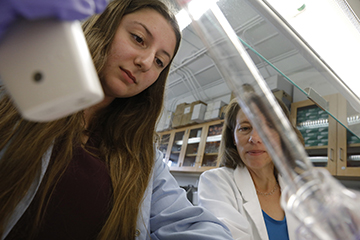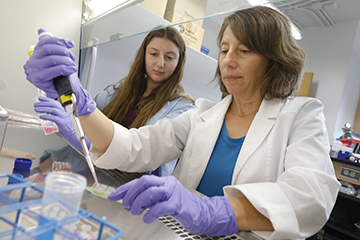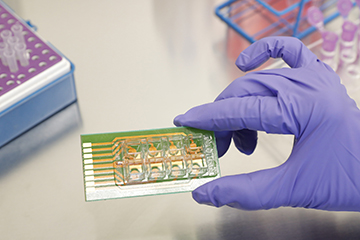
09/13/2022
The nose knows. If Annabella Nilon of Horseheads, N.Y., has her way, that is just the beginning.
Nilon hopes to create a model for detecting specific odors using bioreceptors, the sensitive cells used by living things to identify everything from frightened skunks to cooling pizza.
It’s part of her SUNY Cortland undergraduate summer research fellowship project to study olfactory receptors, including those found in the body beyond the nostrils. Nilon’s project has support from the U.S. Department of Defense, with hopes that it may lead to a biosensor with receptors capable of detecting dangerous chemicals or other airborne threats.
She is one of six 2022 SUNY Cortland undergraduate research summer fellows supported by SUNY Cortland donors. From late May until Aug. 2, the program provides students with a residence hall bed, a campus research space and a $4,000 stipend. The Undergraduate Research Council gives an additional $2,000 to the faculty who mentor a student.

Money and housing aside, students still must supply the most important thing: hard work. Nilon, a biomedical science major, was partly inspired to study olfactory receptors due to her interest in their complexity and use of intracellular pathways.
She also finds it fascinating that these receptors are found in the body beyond the nostrils. So, while it may be true that the nose knows, to a lesser extent, so does the skin, lungs and elsewhere. There's limited understanding of what these oddly placed receptors do and Nilon is eager to find out.
The guidance of her mentor, Theresa Curtis, professor of biological sciences, has been an immense help.
“I have been working with Dr. Curtis for over a year now and I have had the best experience,” Nilon said. “Dr. Curtis is the most supportive mentor in and out of the lab and I truly feel like she has helped me grow immensely as a student researcher. (She) gives me the independence to come up with new ideas and try new things, but she always is there to guide me in the right direction and answer any questions I may have.”
The research is a matter of careful observation and exact measurements. Nilon says the most complicated issue so far has been the cyclic AMP (cAMP) assays — a test measuring molecules that deliver signals within cells.

Although developing a biosensor isn’t easy, the same biological components that challenge Nilon can also set it apart from other sensors. Theoretically, once it’s perfected it could be cheaper to make, more sensitive and easier to adapt to changing situations.
“By genetically altering easy-to-grow cells to express known olfactory receptors, we could create a low-cost field portable biosensor that could detect any odorant of interest," Nilon said.
So far, she's been pleased with her progress. She presented her findings at the university’s annual Transformations: A Student Research and Creativity Conference event. It focuses on student research under the direction of a faculty member that showcases problem-solving skills, creative activity and new conceptual outcomes.
“I was satisfied with the data I presented, and it was nice to see many students and faculty at the event. I am looking forward to presenting again next year.”
Whatever results ultimately come from her research, the knowledge Nilon gains from her summer research will be a big lift in her career goal of attending medical school to become a physician.
"My experiences at Cortland have helped me immensely. I am able to further expand my knowledge of biomedical sciences through my cellular physiology research," Nilon said. "I have also gained strong leadership skills from being the president of both Premed Club and Biology Club, as well as a resident assistant. The support and mentorship I have received from the staff at SUNY Cortland has been amazing and pushes me closer to my goal every single day."
Every student's summer research fellowship is supported by alumni and other donors who fund permanent undergraduate research endowments managed by the Cortland College Foundation. Nilon's donors were Dr. Michael Bond '75 and Dr. Wayne Marley '75.
For more information about Transformations and the opportunities made possible through the Undergraduate Research Council, visit SUNY Cortland's website.